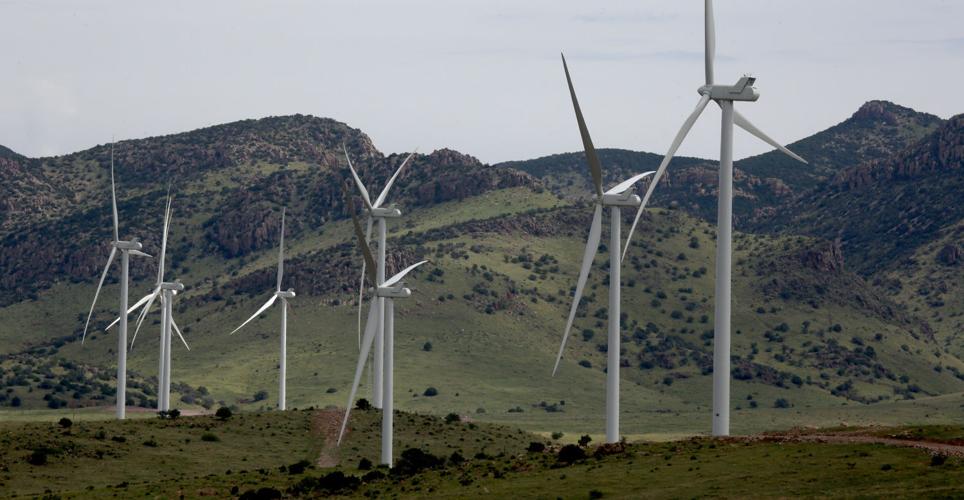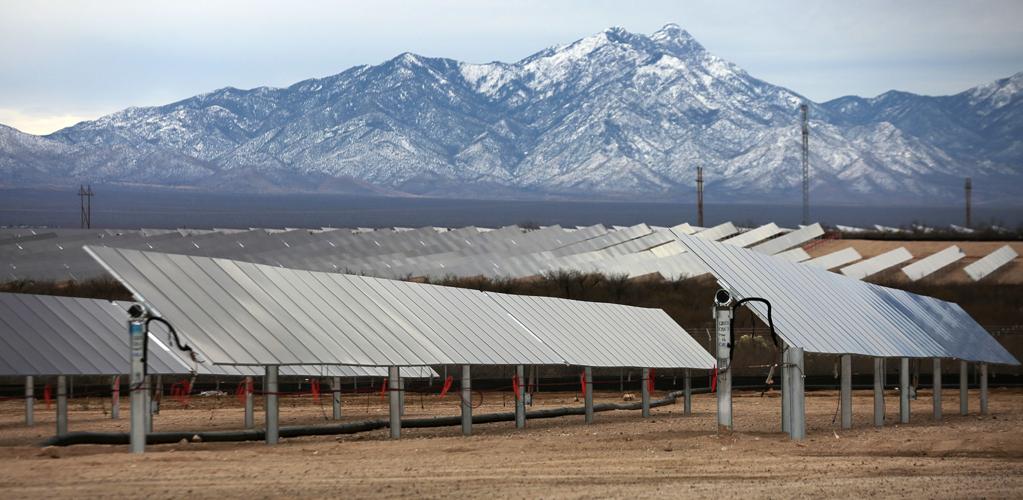Two years after killing off ambitious new state clean-energy standards, Arizona utility regulators are looking to repeal the state’s existing renewable-energy and energy-efficiency rules altogether.
The Arizona Corporation Commission on Tuesday voted to instruct its staff to draft rules that would repeal the state’s Renewable Energy Standard and Tariff, which was adopted in 2006 and requires state-regulated electric utilities including Tucson Electric Power to generate 15% of their energy from renewable resources by 2025.
Along a 4-1 party line vote, the measure approved by the commission’s Republican majority also would move toward repealing energy-efficiency rules adopted in 2010 that require electric and gas utilities to achieve 22% energy savings by 2020.
The ACC vote starts a hearing process expected to last into next year that will include stakeholder and public comment.
Commissioners leading the effort say the renewable-energy and efficiency standards are too costly to ratepayers.
Commissioner Nick Myers said that based on information provided by the regulated utilities, the mandates “imposed by prior Commissions” have cost Arizona customers almost $3 billion through monthly billing surcharges that help pay for solar and wind projects and rebates that drive energy efficiency.
“I believe it is time for the Commission to consider repealing these rules and mandates that appear to unnecessarily drive up costs,” Myers said in a news release.
“Utilities should select the most cost-effective energy mix to provide reliable and affordable service, without being constrained by government-imposed mandates that make it more expensive for their customers,” he said.
The move to drop the green-energy and efficiency rules was approved by Myers, along with fellow Republican commissioners Kevin Thompson, Lea Márquez Peterson and Chairman Jim O’Connor, while the panel’s lone Democrat, Anna Tovar, voted against the measure.
O’Connor said renewable-energy rules initially adopted in 1998 and updated in 2006 were “well-intentioned,” and although commissioners at the time were concerned about the cost to ratepayers, cost reviews were never conducted as intended.
“We began the steps needed to repeal a rule that has cost ratepayers billions of dollars in out of market priced contracts,” O’Connor said. “Mandates distort market signals and are not protective of ratepayers.”
He said Arizona electric utilities have met or exceeded the 2006 renewables requirement, often at prices exceeding the market price.
TEP said that about 21% of its peak power-generation capacity was from renewables in 2021, and renewable energy accounted for about 14% of its retail sales in 2022 according to corporate filings.
The utility says its resource plan will cut its carbon emissions by 80% by 2035, with a goal of reaching “net zero” direct greenhouse-gas emissions by 2050.
As of 2023, 29 states and the District of Columbia had renewable-energy portfolio standards, according to a study by the Lawrence Berkeley National Laboratory.
Compliance costs in states with renewables standards average about 3.5% of customer bills, the study found.
Sources including the U.S. Department of Energy say utility-scale solar and wind can be cheaper than coal- or gas-fired power generation under certain circumstances, even accounting for the renewables’ intermittent power output.
But utilities including TEP say renewables can impose extra costs including the cost of fast-ramping resources like gas plants to meet power demand peaks particularly in the evening when the output of solar plants dwindles.
Thompson said Arizona utilities have collected over a billion dollars in ratepayer surcharges for efficiency initiatives “that have done little to avoid the need for new generation and have benefitted a select few.”
Piggybacking on federal rules adopted in the 1980s to reduce the nation’s dependence on foreign oil and cut environmental impacts, states starting with Texas in 1999 subsequently adopted their own efficiency standards.
Today, 25 states have mandatory statewide energy-efficiency rules, and five states and the District of Columbia have similar goals, with states including Arizona offering ratepayer-support rebates for purchases of energy-efficient equipment.
A representative of a nonprofit group that promotes energy efficiency programs said there is substantial evidence that such programs have resulted in billions of dollars savings by helping consumers cut their energy use and reducing the need to build new power plants.
Caryn Potter, Arizona representative for the Southwest Energy Efficiency Project, told the commission that individual energy efficiency programs must pass a strict test for cost effectiveness, adding that reports by Arizona utilities show that every $1 spent in such programs returned $3.64 in benefits between 2010 and 2022.
“No other utility investment today is held to that same bar,” Potter said. “It is clear for the record that energy efficiency protects our most vulnerable from rate shock, puts Arizona back to work and is in the public interest.”
The Sierra Club is opposed to the repeal of the renewable-energy and efficiency standards, said Ana Gorla, energy and public lands coordinator for the group’s Arizona-based Grand Canyon Chapter.
“These standards have produced enormous benefits for ratepayers, for communities, for our health and our wallet,” Gorla said.
A solar-industry representative said repeal of the renewable-energy rules may have little impact on TEP and other utilities, since they have already surpassed the state mandates and plan to increase green-energy investments.
But Autumn Johnson of the Arizona Solar Energy Industries said by becoming the first state to repeal its relatively modest renewables mandate, the state could drive away developers of “least-cost” solar and wind projects, resulting in Arizona utilities buying more expensive power.
“At the end of the day, it may not actually change the direction the utilities are headed, but it will send the wrong signal to the rest of the country,” Johnson said, noting that 386 solar companies employ more than 8,000 people in the state.
The lack of any mandate could bolster recent plans by TEP and Arizona Public Service Co. to replace much of their coal generation with gas-fired plants, despite the objections of environmentalists that want more solar and wind generation backed by energy-storage systems.
Tucson Electric Power is bringing its biggest solar and wind projects online as it works toward 70% renewable energy.





